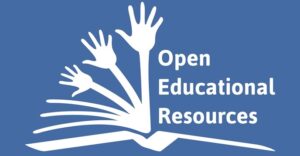Week 8: Annotated Bibliography for Hodgkinson-Williams & Trotter (2018)

UNESCO Open Educational Resources Logo. Image was taken from https://en.unesco.org/themes/ict-education/oer
Hodkinson-Williams and Trotter (2018) utilized Fraser’s (2005) social justice framework to evaluate the impact of open educational resources (OER) and open educational practices (OER) in providing affordable access to culturally relevant education to all.
Fraser perceives social justice as “parity of participation” (2005, p. 73), as both an outcome where “all the relevant social actors […] participate as peers in social life” and as a process in which procedural standards are followed in fair and open processes of deliberation (2005, p. 87) (as cited in, Hodgkinson-Williams & Trotter, 2018). Fraser argues that both outcomes and processes can be socially unjust in three ways: (i) economic maldistribution); (ii) cultural misrecognition; (3) political misframing).
Hodkinson-Willians and Trotter (2018) differentiate between “affirmative” change and “transformative” change. Affirmative change refers to changes “where attention is paid to the inequitable outcomes by ameliorative adjustments” (p. 207). In contrast, transformative change refers to a shift that “addresses the root cause of maldistribution. The authors argue that most changes to OER and OEP are affirmative in nature, but should be transformative. They also provided suggestions for both types changes for each of the three socially unjust ways.
I aim to use this post to share my thoughts, questions and perhaps critique on these proposed changes. These will help be in expanding my knowledge of new these topics (e.g. intellectual property rights, economic theories) as they will provide direction for further personal reading.
Economic maldistribution
Transformative change: OER represents the more transformative intervention than both dealing with piracy as open materials overcome the cost challenges associated with copyright restriction (p.g 212).
OER is essentially a form of foreign aid for some countries and foreign aid can fuel corruption. Some governments have been known to control and restrict the distribution of aid. Moreover, del la Croix and Delavallade (2014) found that there is a significant positive correlation between aid and corruption due to productivity levels. Governments could restrict the distribution of OERs and this could lead to further inequality if only a select few have access to them.
Transformative change: This minimum standard need not require great national or institutional wealth but at least a level of provision where there is no question as to the stability of the power supply, hardware accessibility, and Internet availability (p. 210)
This “minimum standard” may be a grossly underestimated. Yes, providing a student with a computer, internet access and electricity isn’t exactly expensive. However, there are other costs involved. Some of these costs are recurring, and potentially increasing. Teachers need to be trained to use new technologies. Hardware, such as computers, routers, and even power cables (for electrical supply), needs to be maintained and repaired. Furthermore, most developing nations have higher fertility rates and faster growing populations (Shi & Zhang, 2009). This means that the infrastructure needs to expand at the same rate as the population.
Cultural misrecognition
Transformative change: Going forward, open advocates need to consider the cultural dynamics of varying OEP and thus focus less on promoting the use of OER as is and push for the more critical form of OER remixing which has the greater likelihood of promoting social justice.
The authors raised good points about the dangers of adopting OERs wholesale and poor translations. However, simply adjusting OERs to take into account cultural differences may not be sufficient. As discussed in an earlier post, teachers should be involved from the creation stage. Hence, the ideal would be to include local teachers right from the start. Secondly, there is also the risk of developing countries take the easy road of using automation instead of training teachers.
Some governments have also actively tried to shape culture. Recently, there was widespread criticism of the newly and quickly implemented Protection from Online Falsehoods and Manipulation Act (POFMA) by the Singapore Government. POFMA enables the authorities to tackle the spread of fake news or false information, but there are fears that this law also gives the state the power to decide what is fake and restrict free debate (Jaipragas & Sim, 2019). A number of countries in the Global South also have varying levels of internet restriction, and by extension restrictions on freedom of speech (Paul, 2020).
Political misframing
Transformative change: Alter the current IP legislation to allow for educational resources, properly attributed to the authors, to be copied and shared without formal permission or obligatory fee.
This change is good in a situation where there is one advanced nation and a developing nation. The former might be less apprehensive about sharing. However, doing so also allows other advanced nations to utilise these material. Competing nations may not be too supportive of this idea.
On a more personal note, I have noticed that not all teachers will openly share their materials. Often, teachers are ranked within an institution. Hence, teachers can be quite protective of their materials and even those who are willing to share might not do so entirely. I have met teachers who for example, would only disseminate printed copies of their Power Point slides.
References:
de la Croix, D., & Delavallade, C. (2014). Why corrupt governments may receive more foreign aid. Oxford Economic Papers, 66(1), 51-66.
Economy, E. C., (2018, June, 29). China: Xi Jinping’s internet shutdown. The Guardian. https://www.theguardian.com/news/2018/jun/29/the-great-firewall-of-china-xi-jinpings-internet-shutdown
Hodgkinson-Williams, C. A., & Trotter, H. (2018). A Social Justice Framework for Understanding Open Educational Resources and Practices in the Global South. Journal of Learning for Development, 5(3), 204-224
Jaipragas, B., & Sim, D. (2019, December 21). Singapore’s fake news law: protecting the truth, or restricting free debate?. SCMP. https://www.scmp.com/week-asia/politics/article/3043034/singapores-fake-news-law-protecting-truth-or-restricting-free
Paul, E. (2020, May 21). These African countries have various forms of Internet censorship. Techpoint Africa. https://techpoint.africa/2020/05/21/african-countries-censor-internet/
Shi, Y. & Zhang, J. (2009). On High Fertility Rates in Developing Countries: Birth Limits, Birth Taxes, or Education Subsidies? Journal of Population Economics, 22(3), 603-640.




Recent comments